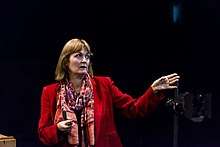Diana Darke
Diana Darke (born 6 March 1956) is an author, Middle East cultural expert, Arabist and occasional BBC broadcaster[1][2][3]. Her work has appeared in the Guardian,[4][5][6] the Financial Times,[7][8] the Sunday Times,[9] the Daily Telegraph[10][11] and Al Araby.[12] She graduated from Wadham College, Oxford, in 1977, where she studied German and Philosophy/Arabic,[13] then went on to work for the British Government Communications Headquarters (GCHQ) and Racal Electronics Plc as an Arabic consultant. In 2005, Diana purchased a 17th-century courtyard house in the Old City of Damascus,[14] which enabled her to become deeply embedded in Syrian society and culture. Diana has returned seven times since the Rebellion began in March 2011 and her links inside the country are deep and ongoing. The house is currently lived in by Syrian refugee friends displaced from their own homes by shelling in the suburbs.
Diana Darke | |
|---|---|
 Author and Middle East expert Diana Darke at a talk at King's College School, Wimbledon | |
| Born | 6 March 1956 |
| Occupation | Author, Middle East expert, Arabist, Broadcaster |
| Spouse(s) | John McHugo |
| Children | Chloe and Max |
| Parent(s) | Alma Hauck and Ronald Taylor |
| Website | dianadarke |
Publications
- Syria, Bradt Travel Guides, 2010, ISBN 978-1-841-62314-6.
- Oman, Bradt Travel Guides, 2010, ISBN 978-1-841-62332-0.
- North Cyprus, Bradt Travel Guides, 2012, ISBN 978-1-841-62372-6.
- Eastern Turkey, Bradt Travel Guides, 2014, ISBN 978-1-841-62490-7
- My House in Damascus: An Inside View of the Syrian Crisis, Haus Publishing, 2016, ISBN 978-1-908-32399-6.
- The Merchant of Syria: A History of Survival, Hurst Publishers, 2018, ISBN 978-1-84904-940-5.
- The Last Sanctuary in Aleppo (co-author), Headline Publishing, 2019, ISBN 978-1-4722-6057-4.
- Stealing from the Saracens: How Islamic Architecture shaped Europe, Hurst Publishers, 2020,
Notes and references
- "Syria peace talks and polls signal Assad's growing confidence". BBC News. Retrieved 22 August 2016.
- "Syria's Golan Heights and its Druze residents, From Our Own Correspondent - BBC Radio 4". BBC. Retrieved 22 August 2016.
- "The strange normality of life in the middle of Syria's war". BBC News. Retrieved 22 August 2016.
- "Kobani's destruction is an opportunity for rebuilding hope". The Guardian. 3 February 2015. ISSN 0261-3077. Retrieved 22 August 2016.
- "The choice in Syria's election: vote for Assad or else …". The Guardian. 2 June 2014. ISSN 0261-3077. Retrieved 22 August 2016.
- "The civil war's threat to Damascus". The Guardian. 2 January 2013. ISSN 0261-3077. Retrieved 22 August 2016.
- "Curious ironies of the Olympics-timed ceasefire in Homs". Financial Times. 10 February 2014. ISSN 0307-1766. Retrieved 22 August 2016.
- "Isis has filled the vacuum in Syria left by the west's inertia". Financial Times. 8 January 2014. ISSN 0307-1766. Retrieved 22 August 2016.
- "Oil and water, not religion, are fuelling Isis campaign to wipe out minorities". The Sunday Times. Retrieved 22 August 2016.
- Darke, Diana (27 June 2015). "We must not allow a few fanatics ruin this fledgling democracy". Daily Telegraph. Retrieved 22 August 2016.
- Darke, Diana (26 June 2015). "Tunisia: 'lessons were not learnt from Bardo museum attack'". Daily Telegraph. Retrieved 22 August 2016.
- Darke, Diana. "Turkey: Free from costly conflicts with its own minorities, Al Araby". Al Araby. Retrieved 22 August 2016.
- "A door to Damascus". Wadham College. Retrieved 22 August 2016.
- "A House in Damascus, From Our Own Correspondent". BBC Radio 4. Retrieved 22 August 2016.